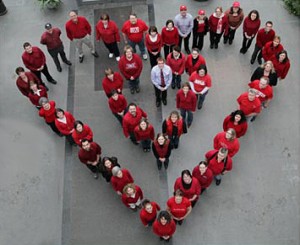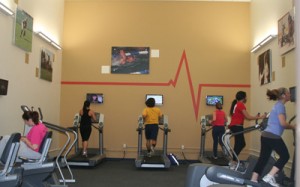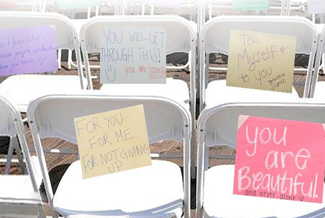Lawrence University’s commitment to the health and well being of its employees has earned it a Gold Well Workplace Award from the Wellness Council of America (WELCOA) in conjunction with the Wellness Council of Wisconsin.
 The Gold Well Workplaces Award recognizes organizations that have successfully built comprehensive worksite wellness initiatives and are demonstrating concrete results.
The Gold Well Workplaces Award recognizes organizations that have successfully built comprehensive worksite wellness initiatives and are demonstrating concrete results.
“As a Well Workplace Award recipient, Lawrence University has joined the ranks of ‘America’s Healthiest Organizations,'” said Patty Leiker, associate director of human resources and Lawrence’s employee wellness coordinator. “Becoming a Well Workplace demonstrates an unparalleled commitment to improving and maintaining the health and well-being of our most valuable asset — our faculty and staff — making quality of life a top priority.”
WELCOA’s Well Workplace awards are based on a criteria of seven “Cs”: Capturing CEO support; Creating a cohesive wellness team; Collecting data to drive health efforts; Carefully crafting an operating plan; Choosing appropriate interventions; Creating a supportive environment; and Carefully evaluating outcomes.
Lawrence’s recent wellness initiatives focused on five specific interventions:

• Healthy Eating/Weight Management. A competition for teams of three people was held from Nov. 13 to Jan. 9 to encourage participants to maintain or lose weight during the holidays. The competition attracted 60 participants (20 teams of three), with 18 teams completing the program. – Total weight lost for all teams was 201 lbs., a 2.2 percent decrease, with one team losing a competition-best 5.72 percent of its combined weight.
• Stress Management. Lawrence partnered with local masseuses to provide on-campus 30- and 60-minute massages in the Wellness Center at reduced costs to participants to promote stress management, relaxation and work/life balance opportunities. Post-massage questionnaire comments indicated the program superseded expectations and participants recommended it to their colleagues.
• Tobacco. In conjunction with the Lawrence University Community Council, plans were approved for an entirely smoke-free campus with the exception of only two designated outdoor smoking areas, one on each end of campus, strategically located away from high-traffic areas. The wellness committee has not received any complaints or concerns since the policy was implemented.

• Physical Activity. In addition to free access to the on-campus wellness center and its pool, gymnasium, cardio equipment, weights, a running track and locker rooms, an on-campus fitness program features yoga, pilates, zumba, a noon walking group and intramural sports, among others, all at no cost to employees. Athletic training services also were available. Average faculty/staff usage increased from 551 visits per month from January-May 2011 to 620 visits per month in January-May 2012.
• Medical Self-Care. Campus-wide QPR (Question-Persuade-Refer) training on suicide awareness was offered to all faculty, staff and students. The “Lawrence Lifeline” program certified individuals as QPR gatekeepers on campus who were trained to identify and initiate discussions with others who might be having thoughts of suicide. More than 90 percent of participants reported increased knowledge of suicide and its prevention and more than 80 percent of participants reported enhanced confidence in incorporating that knowledge into interactions with students.
“The Well Workplace process has been instrumental in helping us to target and develop strategic interventions, evaluate the outcomes of these programs and provide a campus culture that encourages and supports well-being,” said Leiker. “We are thrilled to have had this opportunity and with the support of President Mark Burstein, his cabinet and other campus leaders, we look forward to building an even stronger program and eventually achieving the platinum award.”
Since WELCOA’s inception in 1991, more than 1,000 organizations in both the non-profit and profit sectors have joined the list of “America’s Healthiest Companies” by earning the Well Workplace Award.
“Lawrence University worked hard to successfully meet the rigorous standards set by the Well Workplace process. It is our pleasure to recognize them as the newest Wisconsin employer to achieve Well Workplace status” said Jessica Raddemann, executive director of the Wellness Council of Wisconsin.
Lawrence will host the annual Fox Cities Well Workplace awards ceremony Oct. 29 from 4:30-8 p.m. in the Warch Campus Center. An announcement regarding the status of the Fox Cities as a “Well City USA” will be made that evening. Achieving a Well City designation requires that 20 percent of a community’s entire working population must be employed by at least 20 Well Workplace award-winning organizations.
About Lawrence University
Founded in 1847, Lawrence University uniquely integrates a college of liberal arts and sciences with a nationally recognized conservatory of music, both devoted exclusively to undergraduate education. It was selected for inclusion in the Fiske Guide to Colleges 2014 and the book “Colleges That Change Lives: 40 Schools That Will Change the Way You Think About College.” Individualized learning, the development of multiple interests and community engagement are central to the Lawrence experience. Lawrence draws its 1,500 students from nearly every state and more than 50 countries. Follow Lawrence on Facebook.
